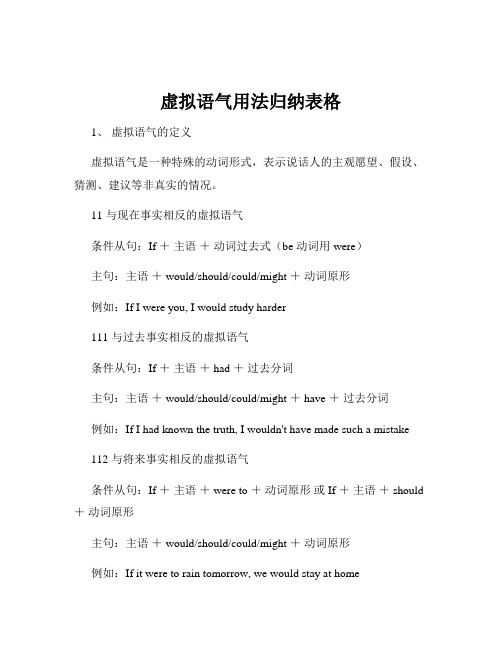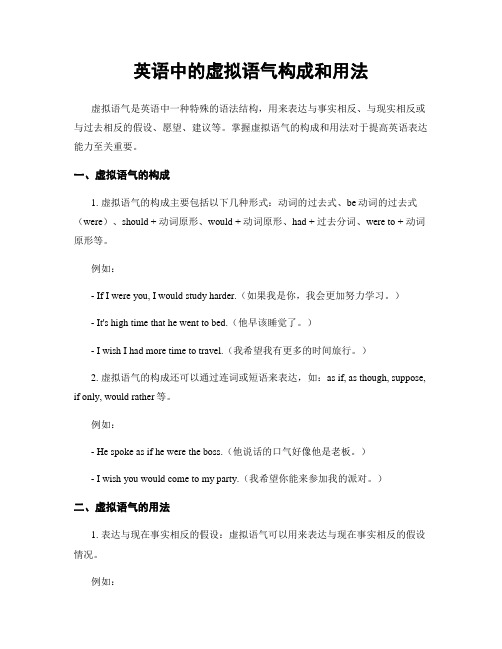虚拟语气should + 动词原形
虚拟语气用法归纳表格

虚拟语气用法归纳表格1、虚拟语气的定义虚拟语气是一种特殊的动词形式,表示说话人的主观愿望、假设、猜测、建议等非真实的情况。
11 与现在事实相反的虚拟语气条件从句:If +主语+动词过去式(be 动词用 were)主句:主语+ would/should/could/might +动词原形例如:If I were you, I would study harder111 与过去事实相反的虚拟语气条件从句:If +主语+ had +过去分词主句:主语+ would/should/could/might + have +过去分词例如:If I had known the truth, I wouldn't have made such a mistake 112 与将来事实相反的虚拟语气条件从句:If +主语+ were to +动词原形或 If +主语+ should +动词原形主句:主语+ would/should/could/might +动词原形例如:If it were to rain tomorrow, we would stay at home121 wish 后的宾语从句与现在事实相反:从句用一般过去时与过去事实相反:从句用过去完成时与将来事实相反:从句用 would/could +动词原形例如:I wish I were a bird (与现在事实相反)122 would rather 后的宾语从句与现在或将来事实相反:从句用一般过去时与过去事实相反:从句用过去完成时例如:I would rather you came tomorrow (与将来事实相反)13 虚拟语气在主语从句中的应用It is +形容词+ that 句型中,形容词为 necessary, important, strange 等时,从句用“should +动词原形”,should 可以省略。
例如:It is necessary that we (should) study hard14 虚拟语气在表语从句和同位语从句中的应用与主语从句类似,在 suggestion, proposal, order 等名词后的表语从句和同位语从句中,从句用“should +动词原形”,should 可以省略。
完整虚拟语气用法表格归纳图

状语从句中的虚拟语气虚拟语气在if引导的条件句中的用法三点:从句(条件)主句(目的)表示于现在事实相反的虚拟条件句If+主语+动词的过去式(be用were)If I had time, I would attendthe meeting.主语+would(should couldmight)+动词原型表示与过去事实相反的拟条件句If+主语+had+动词的过去分词If he had hurried ,he couldhave caught the train.主语+would(should couldmight)+have+动词的过去分词表示与将来事实相反的虚拟条件句1、If+主语+动词过去式2、If+主语+were to+ 动词原形3、If+主语+should +动词原形If I were to go abroad ,I wouldgo to America.主语+would(could shouldmight)+动词原型错综时间条件句——主从句时间不一致的情况下的虚拟语气有时条件从句中的动作与主句中的动作,发生的时间不一致,这是动作的形式应根据它所表示的时间加以调整。
If you had followed my advice , you would be better now.If you had studied hard before, you would be a college student now.含蓄条件句有时虚拟条件句并没用if从句表示出来,而是用介词短语(otherwise,or,without,but for)上下文或其他方式来表示。
1.条件暗含在短语中;2.条件暗含在上下文中;3.虚拟式变为习惯说法,很难找出其暗含的条件。
条件从句中省略if采用倒装语序的情况在if引导的表示虚拟的条件状语从句中,有时可以把虚拟条件中的连词if省去,而将had,should,were等助动词提到主语之前。
should用法总结汇总

千里之行,始于足下。
should用法总结汇总Should是一个情态动词,用于表示建议、意愿、命令、推想等。
它有多种用法和结构,下面将对should的用法进行总结。
1. 表示建议:a. 主语+should+动词原形:用于表示一般性的建议或意愿。
- You should exercise regularly to stay healthy.(你应当经常熬炼以保持健康。
)- We should leave early to avoid traffic.(我们应当提前离开,以避开交通拥堵。
)b. 主语+would/should+动词原形:用于表示有礼貌或客气的建议。
- Would you should drop me off at the station?(你可以把我送到车站吗?)- Should I help you with your luggage?(我来帮你拎行李吗?)c. It is (high) time that+主语+should+动词原形:用于表示“早该……了”。
- It is high time that we should take action to protect the environment.(我们早该实行行动爱护环境了。
)- It is time that you should start looking for a job.(你早该开头找工作了。
)2. 表示命令或要求:主语+should+动词原形:用于表示命令、要求或建议具有强制性的状况。
- You should stop talking in class.(你应当停止在课堂上讲话。
) - They should pay the bill before leaving the restaurant.(他们离开餐厅之前应当先付款。
)第1页/共2页锲而不舍,金石可镂。
3. 表示推想、假设、猜想:a. 主语+should+动词原形:用于表示对某种可能性或预期结果的猜想。
demand虚拟语气用法

demand虚拟语气用法在英语语法中,虚拟语气是非常常见的语法结构。
虚拟语气可能用于表示假设、愿望、建议、命令、推断、猜测等等。
其中,虚拟语气的用法之一是表示demand。
Demand是一个动词,表示强烈请求或要求。
当表达一种demand或要求时,我们可以用虚拟语气。
在虚拟语气中,demand一般表示一种不可能或不现实的要求,也就是说我们要提出的要求不能立即得到满足。
具体来说,在demand的虚拟语气中,常用的结构是should + 动词原形或that + 主语 + (should) + 动词原形。
举个例子,假设你是一位经理,你希望你的员工明天早上8点钟来到公司,但由于那时他们将会有其他安排,这件事就不太可能发生。
在这种情况下,你可以使用demand的虚拟语气来表达你的要求,如:I demand that my employees should be here at 8 a.m. tomorrow morning.在这个例子中,主语是"I",demand后面的that引出了一个从句,并使用了should + 动词原形的结构来表达虚拟语气。
另一个例子是,假设你希望你的合作伙伴支付你一些费用,但你知道这个要求不太可能实现,你可以使用demand的虚拟语气如下:I demand that my partner should pay me the fees owed.在这个例子中,主语是"I",demand后面的that引出了一个从句,并使用了should + 动词原形的结构来表达虚拟语气。
除了should + 动词原形结构之外,还可以使用其他的结构来表达demand的虚拟语气。
例如:- I would demand that he leave immediately.- I insist that you do not make any changes to the agreement.以上例句中,“would demand”表示强烈的要求,“it is imperative”表示必须遵从,“I insist”表示坚决坚持要求。
suggest用法虚拟语气

suggest用法虚拟语气虚拟语气是用来表示假设、虚假、缺乏事实支持等情况的一种语气。
在英语中,虚拟语气常用于条件句、愿望句、建议句、命令句、要求句等情况下。
在本文中,我们将重点讨论虚拟语气在建议句中的用法。
虚拟语气在建议句中的主要用法如下:1.虚拟语气提出建议:通常,建议句中的虚拟语气由"should"引导的动词原形(也可以省略"should")来表示。
例如:- I suggest (that) she should take a break.(我建议她休息一下。
)- It is suggested (that) we should arrive early.(有人建议我们早点到。
)2.虚拟语气表示建议的强烈性:为了表达更强烈的建议,可以使用"strongly"、"highly"等副词修饰建议动词。
例如:- I strongly suggest (that) he should quit smoking.(我强烈建议他戒烟。
)(她强烈推荐你读这本书。
)3.虚拟语气表示建议的逻辑性:在建议句中,使用"would"或"could"来表示建议的逻辑性。
例如:- It would be a good idea (for you) to study abroad.(出国留学对你来说是个好主意。
)- We could try a different approach.(我们可以尝试一种不同的方法。
)4.虚拟语气引导陈述句作为建议:有时候,虚拟语气可以引导一个陈述句,来表达一种虚拟的建议。
例如:- If I were you, I would apologize.(如果我是你,我会道歉。
)- I wish I had taken your advice.(我希望我听了你的建议。
)5.虚拟语气提出反面建议:虚拟语气也可以用来提出反面建议,通常由"shouldn't"或"ought not to"引导。
虚拟语气完整用法

虚拟语气一、用固定的情态动词表示的虚拟语气1、 should +动词原形(有时省略should)(1)用在动词如advise, request, require, suggest, urge,demand,desire,command, insist, order, propose, recommend, 等后的宾语从句中。
例如:1)They requested that we (should) send a invitation to their school、2)He urged that he acquaint and apply the methods、2、用在it is suggested,it has been decided, it is desired, it was proposed,it is required, it was ordered, it is necessary (essential, imperative, important, desirable) that等引出的主语从句中。
例如:1)It is required that we (should) get everything done by tomorrow night、2)It is imperative that the teachers (should) have a thorough knowledge of the subject they teach、3、用在suggestion, motion, proposal, order, recommendation, plan, idea, requirement等引起的表语从句与同位语从句例如:She drives her vessel carefully lest she should lost her way、4.用在表示比拟的方式状语从句中例如:He laughed as if he had never been happier before、5.用在表示虚拟情况的定语从句中例如:It is high time you stop bitting your child、6.用在某些表示主观愿望的名词从句中例1:I wish I were as tall as you、例2:He insisted that we (should) catch up the first bus in the morning、7.用在婉转的请求、建议、批评等句子中例1:Could you hand me some pepper?例2:You might have told me earlier、例3:Hadn’t you better go and see you lover ?8.用在表示祝愿的简单句中例1:Long live world peace、例2:May you best、二.虚拟语气谓语动词的几种表现形式:1.用于虚拟条件句中虚拟条件句及其主句的谓语形式可归纳如下:从句谓语主句谓语与现在事实相反 were, did would (should, could, might) + v、与将来事实相反 should do, would (should, could, might) + v、(可能性极小) were+to+v、与过去事实相反 had done would (should, could, might) + have done例1:I could definitely see the final score if I had the time、例2:How nice it would be if you could bring a gift、例3:Thay might have arrived on time if the car haven’t broken down on the road、如果条件从句中包含有were, had, should或could,有时可把if省略掉,但这时要把were, had, should或could放在主语前面(这种结构在口语中较少使用)。
一坚持二命令三建议四要求的虚拟语气

e.g.The doctor advised that he (should) take more exercise. 医生建议他多锻炼。 His health required that he (should) go to bed early. 他的 健康状况要求他早睡。
suggest表“暗示,表明”,insist表“坚持认 为,坚持说”时,不用虚拟语气。
1、表示“命令”、“建议”、“要求”、“坚持”等词后所带的 名词从句用虚拟语气,结构都是:(should) + 动词原形,其 中should可以省略。 记忆口诀:
一坚持:insist 二命令:order/command 三建议:advise/suggest/recommend 四要求:demand/require/request/ask
6. Her expression suggested that she be angry. 7. They insisted the boy went with them.
____w__a_s ____ __(s_h_o_u_l_d_) _g_o_
4、在主语从句中: It is suggested/required/ordered/… that + 主语 + (should) + 动词原形; It is important/strange/necessary/…that + 主语 + (should) + 动 词原形;
1. The order is that everyone_(_sh_o_u_l_d_) _g_iv_e (give)a five-minute
talk in class.
2.His smile suggested that he h_a_d__s_u_cc_e_e_d_e_d (succeed)in this
英语中的虚拟语气构成和用法

英语中的虚拟语气构成和用法虚拟语气是英语中一种特殊的语法结构,用来表达与事实相反、与现实相反或与过去相反的假设、愿望、建议等。
掌握虚拟语气的构成和用法对于提高英语表达能力至关重要。
一、虚拟语气的构成1. 虚拟语气的构成主要包括以下几种形式:动词的过去式、be动词的过去式(were)、should + 动词原形、would + 动词原形、had + 过去分词、were to + 动词原形等。
例如:- If I were you, I would study harder.(如果我是你,我会更加努力学习。
)- It's high time that he went to bed.(他早该睡觉了。
)- I wish I had more time to travel.(我希望我有更多的时间旅行。
)2. 虚拟语气的构成还可以通过连词或短语来表达,如:as if, as though, suppose, if only, would rather等。
例如:- He spoke as if he were the boss.(他说话的口气好像他是老板。
)- I wish you would come to my party.(我希望你能来参加我的派对。
)二、虚拟语气的用法1. 表达与现在事实相反的假设:虚拟语气可以用来表达与现在事实相反的假设情况。
例如:- If I were you, I would quit that job.(如果我是你,我会辞掉那份工作。
)- I wish I had more money.(我希望我有更多的钱。
)2. 表达与过去事实相反的假设:虚拟语气可以用来表达与过去事实相反的假设情况。
例如:- If I had studied harder, I would have passed the exam.(如果我学得更努力,我就能通过考试了。
)- I wish I had known about the party earlier.(我希望我早点知道这个派对。
- 1、下载文档前请自行甄别文档内容的完整性,平台不提供额外的编辑、内容补充、找答案等附加服务。
- 2、"仅部分预览"的文档,不可在线预览部分如存在完整性等问题,可反馈申请退款(可完整预览的文档不适用该条件!)。
- 3、如文档侵犯您的权益,请联系客服反馈,我们会尽快为您处理(人工客服工作时间:9:00-18:30)。
一、什么是虚拟语气? 什么是虚拟语气? 虚拟语气是一种特殊的动词形式, 虚拟语气是一种特殊的动词形式,用 来表示说话人所说的话并不是事实, 来表示说话人所说的话并不是事实, 而是一种假设、愿望、怀疑或推测。 而是一种假设、愿望、怀疑或推测。
二、虚拟语气的表达形式 (1) ) (should)+动词原形 动词原形
例句: 例句:
1. It is suggested that the question (should) be discussed again. 2. It is proposed that the TV (should )be turned off at least one hour every day. 3. It is insisted that we (should) finish our work at once. 4. It is requested that the boss (should) pay me the salary at once.
衍生句型: 衍生句型:
It is suggested that… (should)+动词原形 动词原形 It is insisted that… It is requested that … It is recommended that… It is proposed that … It is required that… It is advised that… It is ordered that…
1. 表示“建议、命令、决定”等意义 的动词, 表示“建议、命令、决定” 的动词, 如: suggest(建议), recommend(推荐) (建议) 注意: (推荐) 注意: insist(坚决要求), request(要求), (坚决要求) (要求) suggest 表示“暗示、 表示“暗示、 require(要求), order(命令), demand (要求) (命令) 表明” 表明”时不用虚拟语 表示“ 表示 要求) 建议), ),advise等 (要求), propose(气。insist表示“坚持 等, (建议),
衍生词形: 衍生词形:
表示“建议、命令、决定”等意义的名词。 表示“建议、命令、决定”等意义的名词。 Suggestion, recommendation, requirement, proposal, decision ,order, request 等。 1.His suggestion is that the question (should) be discussed again. 2. The boss made the request that we (should) finish our work at once.
认为” 认为”时不用虚拟语 后面的that从句中用(should)+动词原形。 从句中用( 动词原形。 后面的 从句中用 气。 ) 动词原形
例句: 例句:
1. He suggested that the question (should) be discussed again. 2. The e)be turned off at least one hour every day. 3.The boss insisted that we (should) finish our work at once. 4. I request that the boss (should) pay me salary at once.
